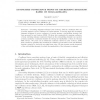285 search results - page 11 / 57 » Computationally Sound, Automated Proofs for Security Protoco... |
IH
2001
Springer
14 years 2 hour ago
2001
Springer
The goal of zero-knowledge watermark detection is to allow a prover to soundly convince a verifier of the presence of a watermark in certain stego-data without revealing any infor...
CCS
2010
ACM
13 years 7 months ago
2010
ACM
Secure two-party computation allows two untrusting parties to jointly compute an arbitrary function on their respective private inputs while revealing no information beyond the ou...
AFRICACRYPT
2009
Springer
14 years 2 months ago
2009
Springer
Abstract. We present a simple zero-knowledge proof of knowledge protocol of which many protocols in the literature are instantiations. These include Schnorr’s protocol for provin...
EUROCRYPT
2007
Springer
14 years 1 months ago
2007
Springer
Protocols proven secure within the universal composability (UC) framework satisfy strong and desirable security properties. Unfortunately, it is known that within the “plain” m...
RTA
2010
Springer
13 years 11 months ago
2010
Springer
Decreasing diagrams technique (van Oostrom, 1994) is a technique that can be widely applied to prove confluence of rewrite systems. To directly apply the decreasing diagrams techn...

